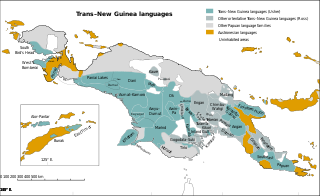
Trans–New Guinea (TNG) is an extensive family of Papuan languages spoken on the island of New Guinea and neighboring islands, a region corresponding to the country Papua New Guinea as well as parts of Indonesia.

The Papuan languages are the non-Austronesian languages spoken on the western Pacific island of New Guinea, as well as neighbouring islands in Indonesia, Solomon Islands, and East Timor. It is a strictly geographical grouping, and does not imply a genetic relationship.
The Sko or Skou languages are a small language family spoken by about 7000 people, mainly along the Vanimo coast of Sandaun Province in Papua New Guinea, with a few being inland from this area and at least one just across the border in the Indonesian province of Papua.

The West Papuan languages are a proposed language family of about two dozen non-Austronesian languages of the Bird's Head Peninsula of far western New Guinea, the island of Halmahera and its vicinity, spoken by about 220,000 people in all. It is not established if they constitute a proper linguistic family or an areal network of genetically unrelated families.
The Foja Range languages, or Tor–Kwerba in more limited scope, are a family of about two dozen Papuan languages. They are named after the Foja Mountains of western New Guinea.
The Ramu–Lower Sepika.k.a.Lower Sepik–Ramu languages are a proposed family of about 35 Papuan languages spoken in the Ramu and Sepik river basins of northern Papua New Guinea. These languages tend to have simple phonologies, with few consonants or vowels and usually no tones.

The Central Solomon languages are the four Papuan languages spoken in the state of Solomon Islands.
The Pauwasi languages are a likely family of Papuan languages, mostly in Indonesia. The subfamilies are at best only distantly related. The best described Pauwasi language is Karkar, across the border in Papua New Guinea. They are spoken around the headwaters of the Pauwasi River in the Indonesian-PNG border region.

The (Greater) West Bomberai languages are a family of Papuan languages spoken on the Bomberai Peninsula of western New Guinea and in East Timor and neighboring islands of Indonesia.
The Kwalean or Humene–Uare languages are a small family of Trans–New Guinea languages spoken in the "Bird's Tail" of New Guinea. They are classified within the Southeast Papuan branch of Trans–New Guinea.
The Demta–Sentani languages form a language family of coastal Indonesian Papua near the Papua New Guinea border.

The Yam languages, also known as the Morehead River languages, are a family of Papuan languages. They include many of the languages south and west of the Fly River in Papua New Guinea and Indonesian Western New Guinea.
Kaki Ae, or Tate, is a language spoken by about 500 people, half the ethnic population, near Kerema, in Papua New Guinea. It was previously known by the foreign designation Raeta Tati.
West Bird's Head languages are a small family of poorly documented Papuan languages spoken on the Bird's Head Peninsula of New Guinea.
Massep is a poorly documented Papuan language spoken by fewer than 50 people in the single village of Masep in West Pantai District, Sarmi Regency, Papua. Despite the small number of speakers, however, language use is vigorous. It is surrounded by the Kwerba languages Airoran and Samarokena.
The Orya–Tor languages are a family of just over a dozen Papuan languages spoken in Western New Guinea, Indonesia.
Molof is a poorly documented Papuan language spoken by about 200 people in Molof village, Senggi District, Keerom Regency.
The Kwerbic, or Greater Kwerba, languages are a family of just under a dozen Papuan languages spoken in Indonesia.
The South Pauwasi languages are a likely small language family of New Guinea, potentially consisting of Yetfa, Kimki, Lepki, Murkim and Kembra.
The Lepki–Murkim languages are a pair to three recently discovered languages of New Guinea, Lepki, Murkim and possibly Kembra.





